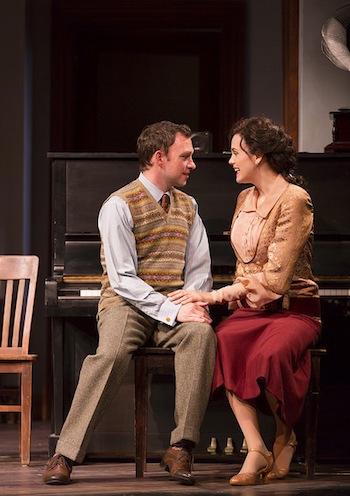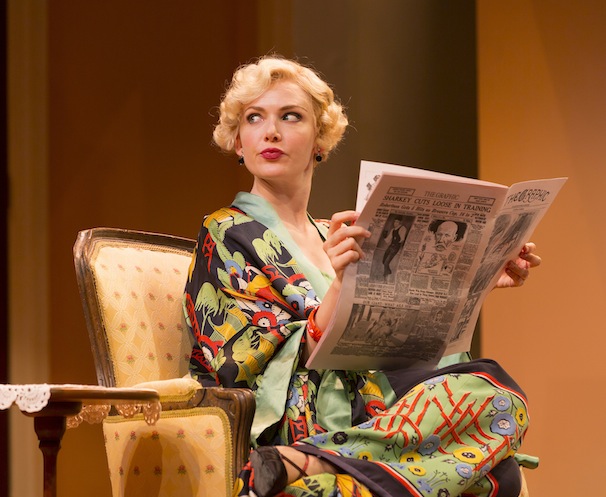Fuse Theater Review: A Glitzy, But Empty, “June Moon”
June Moon is a piece of satirical fluff with 27 characters, lots of piano playing, and a half-dozen memorable lines.
June Moon, by Ring Lardner and George S. Kaufman. Directed by Jessica Stone. At the Williamstown Theatre Festival, Williamstown, MA, through July 13.
By Helen Epstein
Long before Motown, there was Tin Pan Alley, a stretch of Manhattan’s 28th street where lyricists and composers churned out the words and music to what would become The Great American Songbook and other less memorable songs. The Gershwins and Irving Berlin were the stars of this songwriting world, which set all of America playing and humming. Their success led eager wannabes from the hinterland, like the play’s protagonist, to seek their fortunes in New York City.
Fred Stevens of the shipping department at General Electric’s plant in Schenectady is one of these young men in June Moon, a 1929 comedy with music by comic writer Ring Lardner and playwright-director George S Kaufman. His train trip down to the city kicks off a story that satirizes Jazz Age Tin Pan Alley – complete with a rich/bad music publisher, his long-suffering secretary, and gold-digging blondes.
Stevens gets milked for all he’s got by one of them but in the end – you guessed it – he marries the virtuous dental assistant who boarded the train at Hudson.
Based on a short story by Lardner, with a couple of original songs so sappy and derivative that it was said that Lardner and Kaufman intentionally “eavesdropped” rather than composed them, June Moon is a piece of satirical fluff with 27 characters, lots of piano playing, and a half-dozen memorable lines. Why the Williamstown Theatre Festival has invested its extensive resources in this lavish production instead staging a more substantial work is a mystery
Visually, June Moon is a treat. The WTF rarely stints when it comes to spectacle, but these sets by Tobin Ost are particularly plush, gorgeous, and historically correct – from the posh parlor car of the train from upstate New York to Manhattan where Stevens, the aspiring lyricist, meets dental assistant Edna Baker – to the Riverside Drive apartment in which composer Paul Sears lives with his wife and her scheming sister Eileen; to the industrial Manhattan building – complete with pillars, sheet music cubbyholes, grand and upright pianos — where the songwriters congregate and audition new songs for the publisher.
The costumes by Gregg Barnes are wonderfully eye-catching: economy and glam Jazz Age drop-waist dresses and cloches for the women; three-piece suits and period shoes for the men; and a window washer who looks as though he had been painted by Norman Rockwell.

Nate Corddry, Rachel Napoleon in “June Moon” at the Williamstown Theatre Festival. Photo: T. Charles Erickson.
The story, received at the time on Broadway as light, savvy and edgy, now seems heavy and dated as it satirizes songwriting and songwriters. One of the running gags is that lyricists butcher the English they write, delivering lines such as “I won’t have my wife endure a life of druggery” or “They stole my song – I’m suing them for perjury!” or “We saw the Goddess of Liberty.” They have no musical discernment either (“Ten years from now nobody’ll know there was a Gershwin”).
The characters are one cliché incarnate after another: Paul Sears, the composer who hasn’t written a hit tune in years; his bored and restless wife Lucille; her conniving sister Eileen; Mr. Hart, the rich music publisher; Maxie, the sardonic gay Jewish music arranger, who introduces himself as “Schwartz – Maxie Schwartz: it’s a Greek name” and is only too happy to educate out-of-towner Stevens on the facts of city life.
Given the play’s predictability and one-dimensional characters, it’s difficult to say much about the performers. Their characters are flat stereotypes that don’t offer much emotional range in which to work. The cast members all looked terrific and delivered their lines competently. The only stand-out for me was David Turner as Maxie, perhaps a stand-in for Kaufman himself, who manages to both deliver witty lines yet inbue his character with some semblance of nuance.
Lardner’s original short story was titled “Some Like Them Cold” and cold is how this comedy left me. Songwriters today have a very different profile than in the days of Tin Pan Alley and what was sharp in 1929 seems shopworn in 2014. Perhaps director Jessica Stone meant to convey a mercenary attitude towards popular culture as well as dramatize the chilly emptiness of this small world just before the Crash and Great Depression. In last year’s production of George S. Kaufman’s Animal Crackers, the hilarious antics of the Marx Brothers compensated for a predictable plot and characters. This production has mostly glitz.
Helen Epstein is the author of Joe Papp: An American Life and other work on the arts, all available at Plunkett Lake Press.

